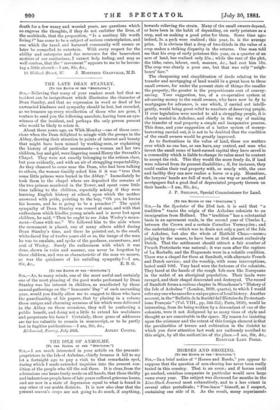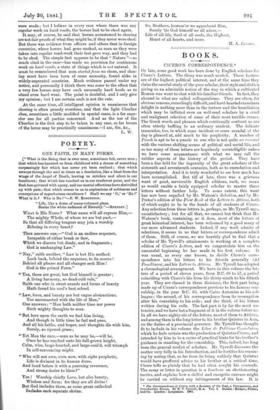HORSES AND SHOEING.
ro THE EDITOR OF THE "SPECTATOR."] Sia,—In a brief notice of "Horses and Roads," you appear to suppose that the question of non-shoeing has never been really tested in this country. That is an error; and if horses could go unshod, omnibus companies in particular would save large sums every year. The subject was discussed for months in the Live-Stock Journal most exhaustively, and to a less extent in several other periodicals ; " Free-lance " himself, as I suspect,. sustaining one side of it. As the result, many experiments
were made ; but I believe in every case where there was any regular work on bard roads, the horses had to-be shod again.
It may, of course, be said that horses accustomed to shoeing are not fair proofs of what they might be, if they never were shod. But there was evidence from officers and others that in foreign countries, where horses had gone unshod, as soon as they were taken into regular road-work their feet gave way, and they had -to be shod. The simple fact appease to be that "Nature "—so much cited in the case—has made no provision for continuous work on hard roads, a state of things which is not natural. It must be remembered that men started from no shoes, and shoe- ing must have been born of some necessity, found alike in widely-separated countries. Much evidence passed under my notice, and personally I think there was some to the effect that a very few horses may have such unusually hard hoofs as to stand even hard wear. The point is doubtful, and I only give my opinion ; but I am certain such is not the rule.
At the same time, all intelligent opinion is unanimous that shoeing is often grossly overdone, and that the light °hailer shoe, sometimes a little modified in special cases, is a far supe- rior one for all parties concerned. And as the use of the Charlier is the first step to be taken in any case, so far lovers of the horse may be practically unanimous.—I am, Sir, Sic., L. W.



































 Previous page
Previous page